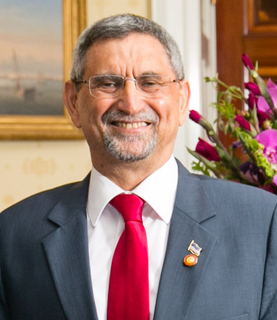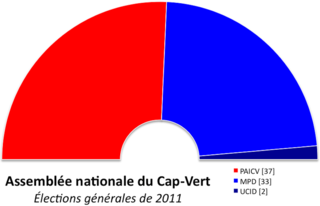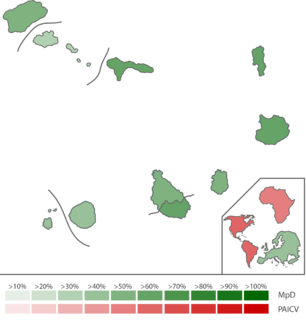
Politics of Cape Verde takes place in a framework of a semi-presidential representative democratic republic, whereby the Prime Minister of Cape Verde is the head of government and the President of the Republic of Cape Verde is the head of state, and of a multi-party system. Executive power is exercised by the President and the Government. Legislative power is vested in both the Government and the National Assembly. The Judiciary is independent of the executive and the legislature. The constitution first approved in 1980 and substantially revised in 1992 forms the basis of government organization. It declares that the government is the "organ that defines, leads, and executes the general internal and external policy of the country" and is responsible to the National Assembly.

Aristides Maria Pereira was a Cape Verdean politician. He was the first President of Cape Verde, serving from 1975 to 1991.

Pedro de Verona Rodrigues Pires was the President of Cape Verde from March 2001 to September 2011. Before becoming President, he was Prime Minister from 1975 to 1991.

José Maria Pereira Neves is a Cape Verdean politician who was Prime Minister of Cape Verde from 2001 to 2016. He is a member of the African Party for the Independence of Cape Verde (PAICV).

The Movement for Democracy is a Christian democratic and liberal party in Cape Verde. Established in 1990, it was the ruling party from 1991 to 2001 and returned to power in the 2016 parliamentary election. Its members are nicknamed "os ventoinhas".
Carlos Alberto Wahnon de Carvalho Veiga is a Cape Verdean politician. He was Prime Minister of Cape Verde from April 4, 1991 to July 29, 2000.

The unicameral National Assembly is the legislative body of the Republic of Cape Verde.

Parliamentary elections were held in Cape Verde on 22 January 2006. The result was a victory for the ruling African Party for the Independence of Cape Verde (PAICV) run by José Maria Neves, which won 41 of the 72 seats in the National Assembly. Second was the Movement for Democracy (Mpd) and third was Democratic and Independent Cape Verdean Union (UCID) led by João Santos dos Luís.
Manuel Inocêncio Sousa is a Cape Verdean politician. Sousa was Minister of Foreign Affairs of Cape Verde from 2001 to 2002 and subsequently Minister of Infrastructure, Transports and Sea
This page list topics related to Cape Verde.

Presidential elections were held in Cape Verde on 7 August 2011, with a second round run-off on 21 August. The result was a victory for Jorge Carlos Fonseca of the Movement for Democracy, who received 54% of the vote in the second round.

Parliamentary elections were held Cape Verde on 6 February 2011. The result was a victory for the ruling African Party for the Independence of Cape Verde (PAICV), led by Prime Minister Jose Maria Neves, which won 38 of the 72 seats in the National Assembly.

Parliamentary elections were held in Cape Verde in June 1975 in preparation for independence from Portugal on 5 July. The African Party for the Independence of Guinea and Cape Verde was the sole legal party at the time, with voters being asked to approve or reject a PAIGC list of 56 members for the National People's Assembly. Its party leader was Aristides Pereira. The list was approved by 95.6% of voters, with a turnout of 86.7%.

Parliamentary elections were held in Cape Verde on 7 December 1980. The country was a one-party state at the time, with the African Party for the Independence of Guinea and Cape Verde (PAIGC) as the sole legal party. Its leader was Aristides Pereira. The PAIGC presented a list of 63 candidates and three substitutes to voters to approve. Ultimately 93.0% of votes were cast for the PAIGC list, the others being blank or void. Voter turnout was 75.0%.

Parliamentary elections were held in Cape Verde on 13 January 1991, the country's first multi-party elections, having previously been a one-party state with the African Party for the Independence of Cape Verde (PAICV) as the sole legal party. The number of seats was reduced from 83 to 79. The result was a victory for the Movement for Democracy, which won 56 of the 79 seats. Voter turnout was 75.3%.

Parliamentary elections were held in Cape Verde on 20 March 2016. The ruling African Party for the Independence of Cape Verde (PAICV), led by Janira Hopffer Almada, was defeated by the Movement for Democracy (MpD), led by Ulisses Correia e Silva.
Janira Isabel Fonseca Hopffer Almada is a politician from Cape Verde who was the leader of the African Party for the Independence of Cape Verde (PAICV) from 2014–2016.
The following lists events that happened during 1981 in Cape Verde.














